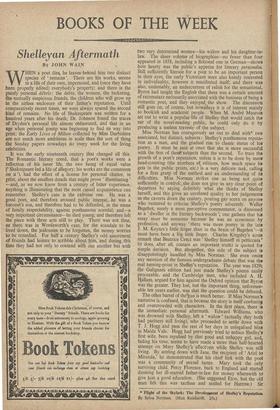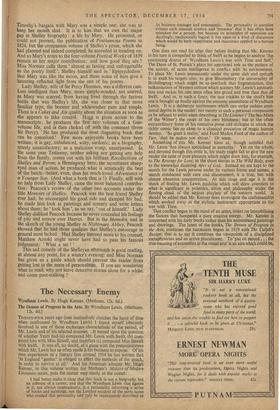BOOKS OF THE WEEK
Shelleyan Aftermath
By JOHN WAIN , WHEN a poet dies, he leaves behind him two distinct species of ' remains '. There are his works, serene in a life of their own, impersonal, and (once they have been properly edited) everybody's property; and there is the purely personal debris: the debts, the women, the bickering, the mutually suspicious friends, the children who will grow up in the airless enclosure of their father's reputation. Until comparatively recent times, we were always spared the second kind of remains. No life of Shakespeare was written for a hundred years after his death; Dr. Johnson found the traces of Dryden's personal life almost obliterated, and that in an age when personal gossip was beginning to find its way into print; the Early Lives of Milton collected by Miss Darbishire are not much more ambitious in scale than the sort of thing the Sunday papers nowadays do every week for the living celebrities.
It was the early nineteenth century that changed all this. Thee Romantic literary creed, that a poet's works were a reflection of his inner life, the two being of equal value (' Shakespeare led a life of allegory; his works are the comments on it '), had the effect of a license for personal chatter, in print, about the smallest details that might prove ' illuminating ' —and, as we now know from a century of bitter experience, anything is illuminating that the most casual acquaintance can remember. Shelley's case is the extreme one. He was a good poet, and therefore aroused public interest; he was a baronet's son, and therefore had to be defended, in the name of family respectability, against posthumous scandal; and—a very important circumstance—he died young, and therefore left the piece with three acts still to play. There was not time, as there was in Wordsworth's case, for the scandals to be lived down, the jealousies to be forgotten, the money worries to be remedied. For half a century Shelley's odd assortment of friends had leisure to scribble about him, and during this time they had not only to contend with one another but with two very determined women—his widow and his daughter-in- law. The sheer volume of biographies—no fewer than four appeared in 1858, including a fictional one in German—shows how hearty was the public's appetite for literary personalia.
Still sufficiently literate for a poet to be an important person in their eyes, the early Victorians were also keenly interested in individuality, however it manifested itself; and there was also, undeniably, an undercurrent of relish for the sensational. Byron had taught the English that there was a certain amount of razzmatazz necessarily associated with the business of being a romantic poet, and they enjoyed the show. The discussion still goes on, of course, but nowadays it is of interest mainly to bookish and academic people. When M. Andre Maurois set out to write a popular life of Shelley that would catch the ear of the novel-reading public, he could only do it by producing a useless travesty of the subject.
Miss Norman has courageously set out to deal with* two associated, but distinct, subjects : Shelley's posthumous reputa- tion as a man, and the gradual rise to classic status of his poetry. It must be said at once that she is more successful with the first of these subjects than the second. To trace the growth of a poet's reputation, unless it is to be done by mere head-counting (the numbers of editions, how much space he gets 'in the public prints, etc.) is a very delicate task, calling for a firm grasp of the method and an understanding of its difficulties. Miss Norman strikes one as being not quite sufficiently in control;,she does not give us any clear point of departure by saying definitely what she thinks of Shelley herself, and this gives an unrelated quality to her judgements as she cavorts down the century, pouring gay scorn on anyone who ventured to criticise Shelley's poetry adversely. Walter Bagehot, surely a most perceptive commentator, is dismissed as a dweller in the literary backwoods '; one gathers that his essay must be nonsense because he was an economist by profession, and anyway ' there was more poetry in the late J. M. Keynes's little, finger than in the brain of Bagehot '—it must have been a big little finger. Charles Kingsley's acute remark that Beatrice Cenci was ' Shelley himself in petticoats' (it does, after all, contain an important truth) is quoted for simple derision. But altogether, this side of the subject is disappointingly handled by Miss Norman. She even omits any mention of the famous undergraduate debate that was the real turning-point in Shelley's reputation. The year was 1829; the Galignani edition had just made Shelley's poems easily procurable, and the Cambridge men, who included A. H.
Itallam, argued for him against the Oxford opinion that Byron was the greater. They lost, but the important thing, unforesee- able ten years earlier, was that the question could be debated. The other barrel of thetun is much better. If Miss Norman's narrative is confused, that is because the story is itself confusing and overcrowded with characters. In the first place, there is the immediate personal aftermath. Edward Williams, who was drowned with Shelley, left a ' widow' (actually they both had partners still living), who proceeded to settle down with T. J. Hogg and pass the rest of her days in unlegalised bliss in Maida Vale. Hogg had previously tried to seduce Shelley's first wife, been repulsed by that good and unhappy girl, and, biding his time, seems to have made a more than half-hearted attempt on Mary Shelley's affections while Shelley was still living. By settling down with Jane, the recipient of ' Ariel to Miranda,' he demonstrated that his chief link with the poet was a community of sexual tastes. Mary took the only surviving child. Percy Florence, back to England and started dunning her ill-starred father-in-law for money wherewith to give him a good education. (She suggested Eton, but the old man felt this was tactless and settled for Harrow.) Sir * Flight of the Skylark: The Development of Shelley's Reputation, By Sylva Norman. (Max Reinhardt. 25s.) Timothy's bargain with Mary was a simple one: she was to keep her mouth shut. It is to him that we owe the major gap in Shelley biography: a life by Mary. He permitted, or could not prevent, the publication of Posthumous Poems in 1824, but the companion volume of Shelley's prose, which she had planned and indeed completed, he suceeded in treading on. And so Mary's notes to the four-volume Poetical Works of 1839 remain as her major contribution: and how good they are ! Miss Norman calls them almost as lasting and unforgettable as the poetry itself '; Shelley himself said in Epipsychidion ' that Mary was like the moon, and these notes of hers give a haunting reflected light from the sun of his poems.
Lady Shelley, wife of Sir Percy Florence, was a different case. Less intelligent than Mary, more simple-minded. not scarred, as Mary was scarred, from having lived through the furious battle that was Shelley's life, she was closer to that more familiar type, the booster and whitewasher pure and simple. There is a Cakes and Ale quality about the situation as soon as she appears to take control. Hogg is given access to the manuscripts : he produces the first two volumes of a four- volume life, and is then choked off with the comment (from Sir Percy), He has produced the most disgusting book that can be conceived.' Few more enjoyable books have been written; it is gay, unbalanced, witty, sardonic; as a biography, utterly unsatisfactory; as a malicious romp, unsurpassed. In the same year Trelawny, neither asking nor getting any help from the family, comes out with his brilliant Recollections of Shelley and Byron; a Hemingway hero, the incontinent sharp- eyed man of action, he produced what is artistically the best of the batch—better, even, than his much-loved Adventures of a Younger Son. (And what a book that is 1) Finally, still with no help from Lady Shelley, came the most balanced contribu- tion : Peacock's review of the other two accounts under the title Memoirs of Shelley. Peacock was the best friend Shelley ever had; he encouraged his good side and damped his bad; he made him look at paintings and scenery and write letters about them; he took him ', as we say, out of himself.' Lady Shelley disliked Peacock because he never concealed his feelings of pity and sorrow over Harriet. But in the Memoirs, and in the sketch of the young Shelley in Nightmare A bbey, Peacock showed that he had those qualities that Shelley's entourage in general most lacked. Had Shelley listened more to his counsel, Matthew Arnold might never have had to pass his famous Judgement : ' What a set ' This sad comedy of the Shelleyan aftermath is good reading, at almost any point, for a winter's evening: and Miss Norman has given us a guide which should prevent the reader from getting lost in the, maze of personalities. If you are wondering what to read, why not leave detective stories alone for a while, and come poet-stalking ?



































 Previous page
Previous page